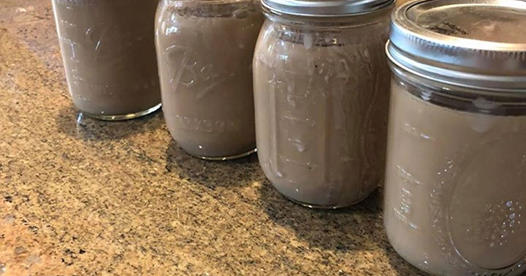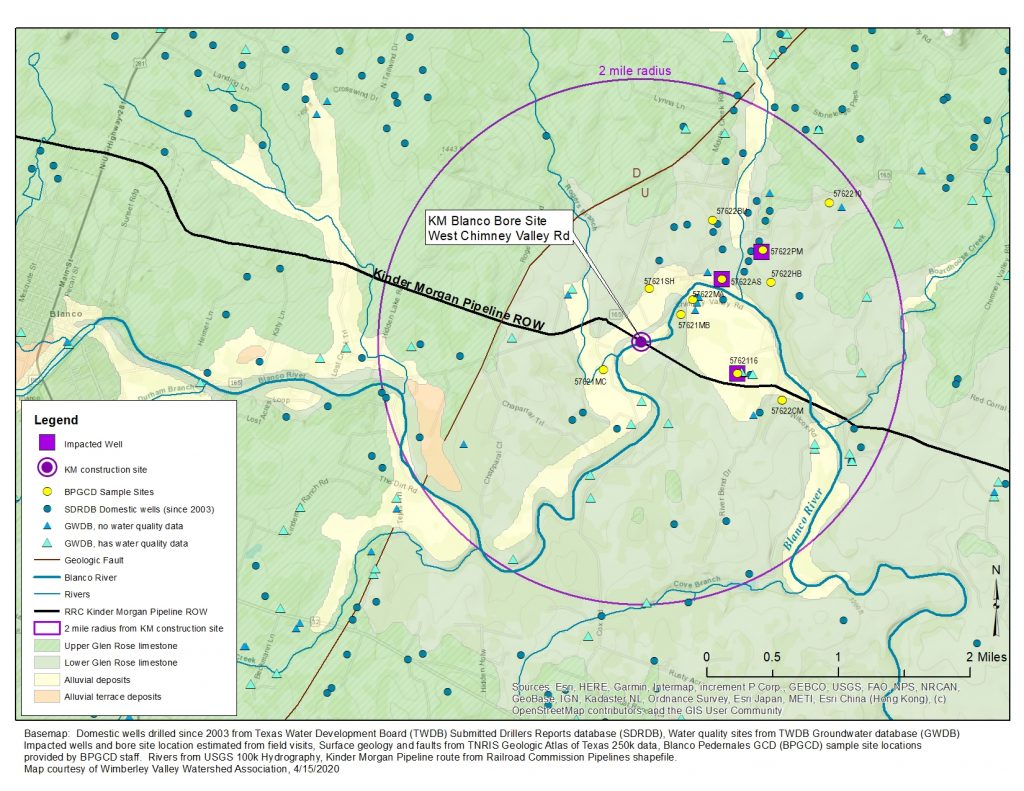Water Samples from Homes Near Construction Blunder Were Found to Contain Trace Metal Levels that Exceed EPA Drinking Water Standards
WIMBERLEY, TX Three days following the March 28 underground loss of 36,000 gallons of drilling fluid during construction of the Permian Highway Pipeline in Blanco County, two affected homeowners captured well samples of their chocolate-colored drinking water and had the samples delivered to LCRA Environmental Laboratory Services in Austin for testing and analyses.

The resulting groundwater quality data set has been submitted to the Texas Railroad Commission to inform its current Notice of Violation action against Kinder Morgan issued on April 9, 2020. The data set includes 14 selected inorganic chemical constituents (metals) that have been analyzed and compared to the values for the Environmental Protection Agency’s (EPA) water quality criteria by Raymond Slade, Jr., a certified professional hydrologist with 35 years at USGS and 17 years as a hydrology consultant in Central Texas.
Mr. Slade, who volunteered his professional expertise and opinion for the analyses, put his stamp on a report that includes six constituents known as Class 1 carcinogens found in excess of EPA drinking water regulations, including aluminum, arsenic, beryllium, cadmium, chromium and nickel. In interpreting this data, it is important to note that this was one sampling event right after the incident and concentrations are expected to lessen over time. However, according to Mr. Slade’s report, “Many pollutants including carcinogens are known to be contained in the spilled drilling fluid, despite denial of such by a Kinder Morgan spokes[person].”
While none of the above chemicals in this preliminary report are identified as single-exposure threats to human health, Wimberley Valley Watershed Association (WVWA) and Trinity Edwards Springs Protection Association (TESPA) encourage homeowners within a two-mile radius of the site where drilling fluids were discharged [see map below] to watch for changes in taste, color or appearance of well drinking water. The Trinity Aquifer is a karst aquifer that serves as the main water supply for the surrounding community and is known for rapid groundwater movement through cracks, faults, and cave conduits.
For safety and peace of mind, concerned well owners are further encouraged to have well water tested by an accredited, professional water quality laboratory. Recommended laboratories include the Edwards Aquifer Research and Data Center at Texas State University in San Marcos and LCRA Environmental Laboratory Services in Austin. Another valuable resource for well owners is found at EPA’s webpage for Private Drinking Water Wells.
Representatives of the Blanco Pedernales Groundwater Conservation District (BPGCD) have also taken water samples at a dozen local wells. The sampling report provided by BPGCD shows results for testing basic water chemistry and total suspended solids (TSS), but does not include sample data for trace minerals as set forth in EPA drinking water regulations.
According to David Baker of WVWA, “There is no doubt that contamination by carcinogens occurred and that even basic construction of this pipeline in the karst aquifers of the Texas Hill Country is not safe for homeowners reliant on groundwater along the current pipeline route. Kinder Morgan has other options, but the landowners do not have other options for their water supply. This simply should not be allowed to happen.”
Patrick Cox of TESPA echoed the sentiment, adding “Kinder Morgan was given the green light by our regulatory agencies, and that green light needs to become a big red light. It should be clear to all involved that this pipeline project should be stopped until a better route or way forward is found.”
Again, according to Baker, “We are calling on all agencies that have some responsibility here – the EPA, TCEQ, Texas Railroad Commission, U.S. Army Corps of Engineers, and the U.S. Fish & Wildlife Service – to stand up for the people and stop this pipeline now. Kinder Morgan violated the public trust of these agencies and the people of the Hill Country. They should not be allowed to continue along this route with this technology. It has failed.”
Attachments
Useful Links
-
- Residential well sampling lab options (Barton Springs Edwards Aquifer Conservation District Well Owner Resources page)
- US EPA Well Owner Guidance
- SaveTheHillCountry.org WVWA Permian Highway Pipeline Page
- TESPA Permian Highway Pipeline page
- WVWA Sediment Impacts to Wells News post (with links to media coverage of PHP discharge)
- https://zaraenvironmental.com/well-and-spring-sampling.html
Media Contacts
-
- David Baker, WVWA Executive Director, davidbaker@wimberleywatershed.org
- Patrick Cox, PhD., TESPA Executive Director, patrickcox7@gmail.com
- Karen Ford, WaterPR, kford@waterpr.com